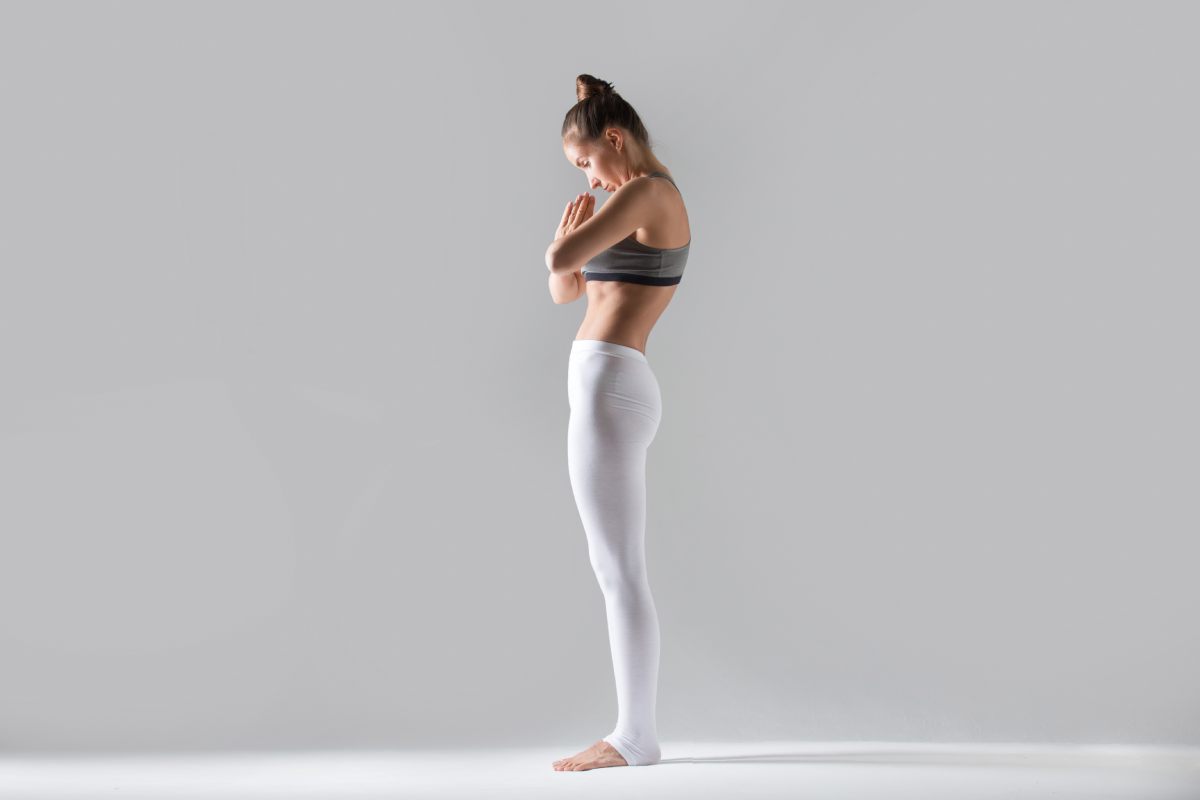Why the simplest pose might be the most important one
When you think of Surya Namaskar (Sun Salutation), it’s easy to focus on the flowing movement, the stretches, and the breathwork. But there’s one pose that often goes unnoticed—Pranamasana, or the Prayer Pose.
It’s the first and last posture in the sequence. At first glance, it seems like just a quiet pause between dynamic movements. But in truth, it’s much more than that.
In this blog, we’ll dive into the real benefits of Pranamasana and why you shouldn’t overlook it, especially if you’re trying to deepen your practice or simply reconnect with yourself.
What Is Pranamasana?
Pranamasana (pronounced pra-nah-MAHS-uh-nuh) is the pose where you stand tall, bring your palms together in front of your chest, and take a moment to breathe. It’s also called Anjali Mudra when used as a hand gesture in yoga and meditation.
How to perform it:
- Stand straight with your feet together, grounding into the earth.
- Bring your palms together at your heart center in a prayer position.
- Keep your elbows relaxed, your spine tall, and your shoulders soft.
- Close your eyes if it’s comfortable and take a few slow, deep breaths.
That’s it. Simple? Yes. But it’s where the transformation begins.
Why Is Pranamasana Important in Surya Namaskar?
Pranamasana isn’t just a starting or ending point—it’s an anchor. It gives your body a moment to align and your mind a moment to arrive.
It helps you:
- Set an intention for your practice
- Transition into a state of mindfulness
- Pause, reflect, and recalibrate your breath and focus
Now, let’s break down the benefits you get from this pose—physically, mentally, and emotionally.
Physical Benefits of Pranamasana
Although it’s a static pose, Pranamasana has several subtle physical advantages that build over time.
1. Improves Posture
Bringing your palms together while standing tall helps align your spine naturally. It brings awareness to your shoulders, hips, and core—encouraging you to stand upright and avoid slouching.
2. Enhances Balance and Stability
By pressing both feet into the ground and distributing your weight evenly, Pranamasana strengthens your sense of balance. Your leg and foot muscles engage, especially when you focus on rooting down.
3. Tones Lower Body Muscles
Though not a dynamic pose, the act of standing mindfully works on:
- Quadriceps
- Calves
- Ankles
With regular practice, these muscles become more stable and grounded.
4. Opens the Chest and Shoulders
When your hands come together in front of your chest, it gently lifts the sternum and encourages the shoulders to move back. This opens up the front body, improving posture and circulation.
Mental and Emotional Benefits
The stillness in Pranamasana is not passive—it’s powerful. Here’s how it supports emotional and mental clarity:
1. Calms the Nervous System
Pausing in Pranamasana, especially with deep breathing, signals your nervous system to slow down. It helps reduce tension and eases anxiety.
2. Creates a Moment of Intention
This is your reset button. At the start of the sequence, it’s a chance to set your focus. At the end, it helps you reflect and come back to stillness with awareness.
3. Encourages Presence and Mindfulness
In the midst of a busy day or a fast-paced flow, Pranamasana asks you to pause. Not for the sake of stopping, but to fully arrive in the moment.
4. Fosters a Sense of Gratitude
The act of placing your hands at your heart, closing your eyes, and tuning inward is naturally humbling. It reminds you to be thankful—for your body, your breath, and the practice itself.
Energetic Benefits: Balancing the Heart Center
In yogic philosophy, Pranamasana activates the Anahata Chakra—the heart center. This energy center is associated with love, compassion, forgiveness, and inner peace.
Practicing Pranamasana helps:
- Soften emotional tension
- Release stored grief or resentment
- Open the space for emotional healing
- Enhance empathy and kindness (toward yourself and others)
Even a minute in this pose can shift how you feel emotionally.
How to Integrate Pranamasana Into Your Day
You don’t need to be doing a full yoga session to benefit from Pranamasana. It can be your go-to reset throughout the day.
1. Morning Intention Setting
Before checking your phone or starting your day, stand tall, bring your palms together, and breathe in silence for a few moments. This sets a positive, mindful tone for the hours ahead.
2. Midday Pause
Feeling overwhelmed or scattered? Step away from your desk, place your hands in Pranamasana, and take five deep breaths. It helps recentre your attention and calm your nerves.
3. Evening Reflection
Use it as a way to wind down. Think of one thing you’re grateful for, or just observe how your body feels after a long day. It’s a peaceful way to transition into rest.
Tips to Get the Most Out of Pranamasana
- Keep your breath natural but steady. If you can, try to deepen the inhale and exhale.
- Close your eyes if you feel safe doing so. It helps you turn inward.
- Visualize your heartbeat or chest rising with each breath. This strengthens your connection to your inner world.
- Try holding it longer than usual. Even two to three minutes in silence can be deeply nourishing.
Pranamasana in Daily Yoga Practice
Within Surya Namaskar, this pose becomes a conscious pause before and after movement. But you can also incorporate it in:
- The beginning of a yoga class to ground yourself
- Between sequences to regain balance
- At the end of savasana as a moment of gratitude
By seeing it as more than a transition pose, you elevate its impact.
What Most People Miss About Pranamasana
Many skip through it.
In a rush to get to the “main” poses, people often treat Pranamasana as a quick start or a formality. But this mindset misses the magic. In yoga, presence matters more than performance. And Pranamasana teaches that.
It shows that:
- Stillness is strength
- Quiet can be powerful
- Beginning with intention makes everything more meaningful
A Reminder Worth Repeating
You don’t need to bend deeply or twist intensely to experience the heart of yoga. Sometimes, standing tall with your palms pressed together and eyes closed is enough to transform your mood, your day, and your connection to yourself.
Final Thoughts
Pranamasana is the silent strength within Surya Namaskar. It grounds you. It calms you. It reminds you to pause.
As you explore your yoga journey, don’t overlook the quiet moments. They often hold the deepest wisdom.
So the next time you bring your hands together at your heart, take a breath and truly feel it.
Let it be more than a pose—let it be a practice of presence.




